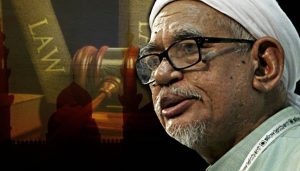RUU 355: No harm, no foul

The Hadi Awang private member’s bill is on the order paper and may be debated in the House this session after government matters are concluded
By Dr Kamarul Zaman Yusoff, Tanjak
A number of our laws that are outdated may and indeed should be amended in keeping with the times and current needs, Attorney-General Mohamed Apandi Ali said last month speaking to reporters.
Although the AG was referring specifically to the Common Gaming Houses Act which dates all the way back to 1953, nonetheless there are other laws too already past 60 years old, and their punishments now rendered wholly inadequate.
Apandi cited the maximum penalty of RM100 under the Minor Offences Act as one example of a fine where its amount has ceased to be a deterrent under present circumstances.
Another such outdated law, we might add, is Act 355 — the Syariah Courts (Criminal Jurisdiction) Act 1965.
When the Acts were first enacted, parliament had intended the legislation to be relevant.
Our current lawmakers, such as Abdul Hadi Awang who is MP for Marang, believe that the sentences available to punish syariah criminal offenders should also be increased befitting our evolved situation.
There is no reason why we should not rightly support Hadi’s efforts to update Act 355 that was created more than half a century ago.
 Purple rally — a gathering in support of RUU 355 on Feb 18
Purple rally — a gathering in support of RUU 355 on Feb 18
Back in 1965
Act 355 was read for the second time during the parliamentary sitting on 3 March 1965 by Tun Abdul Rahman Yaakub, who at the time was the Minister of Land and Mines.
The Act was being introduced based on a constitutional need that arose at the time, he explained.
Since Independence, there have been many state enactments passed by the respective state legislative bodies that provide different punishments for offences that are enumerated in List II (State List), Ninth Schedule of the federal constitution, Abdul Rahman enumerated.
The state’s power to make such enactments are contained in Item 1 List II which states,
“…the constitution, organization and procedure of Syariah courts, which shall have jurisdiction only over persons professing the religion of Islam and in respect only of any of the matters included in this paragraph, but shall not have jurisdiction in respect of offences except in so far as conferred by federal law;…”
Abdul Rahman clarified that Act 355, via its Section 2, gives jurisdiction to the syariah courts relating to these offences whereas Section 3 of the Act renders all offences tried prior to the coming into force of the Act as validly tried as if jurisdiction in respect thereof had been conferred on those courts by Federal law.
In the parliamentary debate, support for Act 355 was voiced by Mohamed Asri Muda, Fatimah Abdul Majid and Wan Abdul Kadir Ismail.
Act 355 source of syariah court jurisdiction
According to the Hansard, PAS president Mohamed Asri had stated that Act 355 was “a good effort in preliminary steps towards unifying the positions of the syariah courts throughout the nation”.
Federal legislator cum Wanita Umno chief Fatimah said, “indeed it is a must for a permanent law to be enacted to standardize the punishments for offences carried out in this country”.
Umno MP for Kuala Terengganu Wan Abdul Kadir said, “standardization of the enforcement of syariah laws has been the dream and aspiration of everybody in this state”.
In replying to Mohamed Asri, who asked for a guarantee that the limitations for stricter sentences would not be made absolute, Abdul Rahman in his closing statement mentioned: “The answer is yes… if the Parliament in the future thinks that the sentences in Section 2 are insufficient, the same can be amended”.
At that point in time (1965), it was noted by Mohamed Asri how Act 355 had granted powers of a magnitude to the syariah courts, and the heartening development was embraced positively by his Islamist party.


